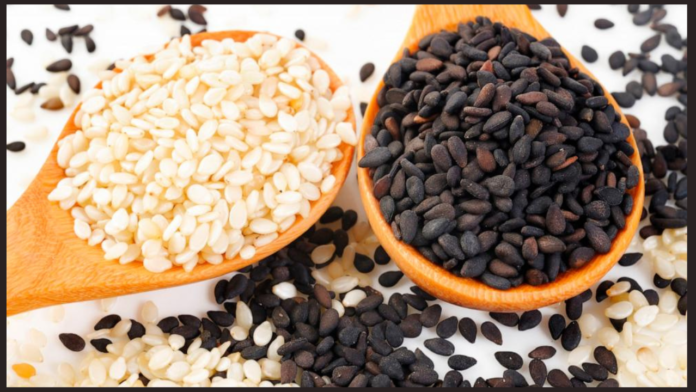T
The term “superfood” has gained some traction as a catchphrase, frequently employed
by influencers or corporations to promote their products with grandiose claims. But
sesame seeds—which you may already have in your kitchen pantry—are a tiny but
powerful challenger that can add to a long list of possible health advantages and be a
great complement to a diet that is already well-balanced.

These tiny, crispy, egg-shaped seeds are used in many Asian and African dishes, as well as Latin American and Mediterranean ones, and many more. They are overflowing with fruity taste. Apart from being a staple in numerous recipes, sesame seeds go through several stages of processing such as toasting to extract aromatic oils, blending them to create smooth tahini, or just tossing them into salads.
sesame seeds
However, the advantages extend beyond improving a dish’s flavor and texture.
Customers recognize protein-dense, edible seeds from sushi to bagels, which are actually derived from the tiny green pods of the sesame plant (Sesamum indicum). Upon cracking open, each pod contains about 80 seeds.
Historians generally concur that this plant’s cultivation started at least 5,000 years ago
in what is now Pakistan and India, even if specialists are divided on whether it originated
in Southeast Africa or India (The Real Food Encyclopedia). It has continued to be an
essential food staple for many years.
The health advantages of sesame are echoed by traditional Chinese medicine and
ancient Indian holistic medicine, Ayurveda, particularly in the winter months. But these
assertions lack empirical backing, and Western medicine has yet to fully accept them.
Benefits of Sesame Seeds for Health
Sesame seeds are a good source of fiber and heart-healthy lipids, just like other seeds.
Lead Dietitian Liz Wendy, MPH, RD, at Ohio University, says, “They are rich in calcium,
magnesium, vitamin E, and iron.”
Wexner Medical Center at State University, as reported by “Good Morning America.”
Before making any big dietary adjustments, it’s best to speak with a primary care
physician or a nutritionist. Every individual has different dietary requirements depending
on their
individual makeup.
Wendy underlines, “The tiny sesame seeds are thought to be ‘heart-healthy,’ as they are a
rich source of fiber and healthy fats. They also include additional substances that can
help decrease blood triglyceride levels and cholesterol.”
Recall that making minor, constructive dietary adjustments might improve your general
health, but it’s always advisable to get tailored guidance based on your unique medical
requirements.
Sesame seeds are a nutritional powerhouse that include compounds similar to copper
that enhance immunological functioning.
According to Wendy, “Sesame seeds harbor numerous nutritional elements that support
immune functions, including copper, zinc, selenium, and B-vitamins.
” She continues, “Sesame seeds are especially a good source of zinc, which is crucial for
the development of immune system cells.”
Given that a tablespoon of sesame seeds has roughly 1.6 grams of protein, according to
the U.S. Department of Agriculture, Wendy was prompted to emphasize that,
Even though they might not be the greatest source of protein unless consumed in
greater amounts, they
are still a good plant-based protein option.”
She continues: “They are a good source of plant-based protein despite that.”
Sesame can be a simple yet efficient way to add these vital nutrients to your meals
when incorporated into a balanced diet.
In summary, while evaluating what constitutes a “superfood,” Wendy points out that although sesame seeds are nutrient-dense, frequent and consistent consumption is necessary to fully reap their health and nutrition benefits.
She points out, “If someone is incorporating sesame seeds into their diet alongside other healthful foods, the benefits are likely to be significant because it contributes to an overall nutritious eating pattern.”
“I think about those individuals who consistently maintain a balanced diet; they might be gaining a lot of benefits from sesame seeds,
” she continues.Essentially, the secret to maximizing the health advantages of sesame seeds appears to be to incorporate them into your diet on a daily basis.
In the larger discussion of what constitutes a “superfood,” Wendy emphasizes the importance of incorporating sesame seeds—a nutritious powerhouse—into your diet on a daily basis. This guarantees that their advantages for nutrition and general health are fully realized.
She points out, “If someone includes sesame seeds in their diet alongside other nutritious foods, the benefits will be noticeable because it becomes an integral part of a well-balanced meal.” “I think about those individuals who consistently maintain a balanced diet; they might be gaining many benefits from sesame seeds,” she continues.
Essentially, the secret to realizing the potential health benefits of sesame seeds for both seems to be to incorporate them into your meals on a daily basis.



